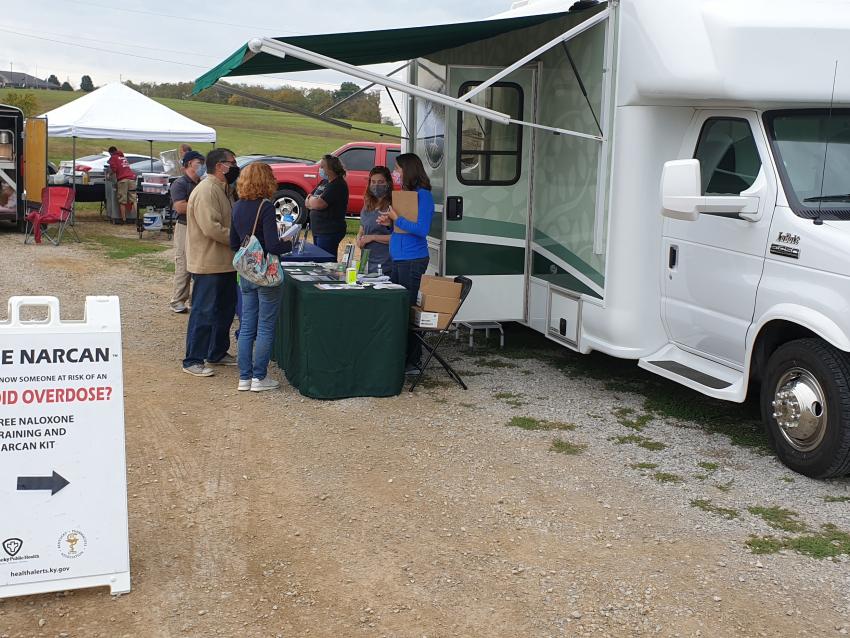
Mobile Harm Reduction Unit teams up with COVID-19 testing events
Despite interruptions from an ongoing pandemic, the Mobile Harm Reduction Unit has been able to partner with local health departments to distribute naloxone kits and educational handouts during COVID-19 testing events.
Jody Jaggers, Director of Pharmacy Public Health Programs for the Kentucky Pharmacy Education & Research Foundation, said the mobile unit’s mission is to travel to mobile, or remote, events to hopefully make it easier for people to access naloxone. However, the mobile unit’s plans were disrupted by the pandemic, which forced the team to get creative.
“We realized that several health departments are offering drive-through COVID-19 testing events and thought perhaps that might be an opportunity for us to partner with them to provide naloxone education and distribution to interested individuals that were already coming to be tested,” Jaggers said.
The Mobile Harm Reduction Unit partnered with the Franklin County Health Department (FCHD) to pilot the program.
Sally Brunner, a nurse administrator with the FCHD, said the first event in July came together quickly. After a meeting on July 7, a community event was held July 22 at Dolly Graham Park, which Brunner said was an efficient and productive endeavor.
“Providing multiple services with a ‘one-stop-shop’ concept was a success,” Brunner said. “FCHD has performed other multiple service events and has learned that creating ‘easy access’ to health care and education is key. Partnering with the [Mobile Harm Reduction] Unit proved beneficial to our clients and to the community in a unique way.”
From July to November, the Mobile Harm Reduction Unit was deployed for nine events in seven counties and dispensed 408 two-dose units of Narcan.
Jaggers said the response so far has been positive.
“Many people getting tested for COVID-19 also received naloxone education and free doses of Narcan to take home,” he said. “Several have shared stories of loved ones or friends/neighbors that have substance use struggles.”
Not all events were paired with COVID-19 testing due to the limited resources of some local health departments. Events ranged from stand-alone naloxone training to opioid overdose awareness walks and COVID-19 and HIV/HCV testing. When possible, teams of two or more engaged in street-level outreach at sites remote from the main event.
Jaggers said events have been suspended due to the surging COVID-19 cases as well as the onset of less predictable weather. However, the team is developing a process to provide virtual events that are county-specific.
“We are not attempting to participate in flu vaccine events at the moment, though we might be able to tie in with COVID-19 vaccination events in the future,” he added.
Jaggers said the best way for people to find out about events is to follow their local health department on social media.
The Mobile Harm Reduction Unit is a partnership between the Kentucky Department for Public Health, The Cabinet for Health and Family Services (via the Kentucky Opioid Response Effort [KORE] grant), the Kentucky Injury Prevention and Research Center (via the Overdose Data to Action [OD2A] grant), and the Kentucky Pharmacists Association/Kentucky Pharmacy Education & Research Foundation.
The Mobile Harm Reduction Unit is funded by CDC OD2A Grant 6 NU17CE924971-02-02. As part of the KORE, naloxone distributed at these events is funded by SAMHSA Grant 1H79TI081704 awarded to the Kentucky Cabinet for Health and Family Services with distribution coordinated by the Kentucky Pharmacists Association.